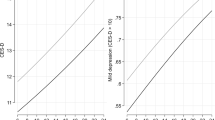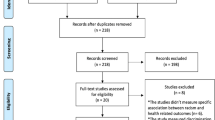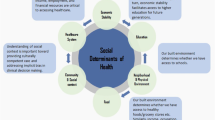Abstract
Discrimination is associated with adverse health outcomes, but few studies have examined the association of discrimination with diabetes-related outcomes including mental health and glycemic control, particularly for immigrant and US-born Latinos. We analyzed survey data (n = 222) collected at baseline of a diabetes intervention. Using multiple linear regression, we examined the association of racial/ethnic discrimination with depressive symptoms, diabetes-related distress, and HbA1c, and variation in these associations by nativity and, for immigrants, length of US residence. Racial/ethnic discrimination was positively associated with depressive symptoms (b = 2.57, SE = 0.45, p < 0.01) and diabetes-related distress (b = 0.30, SE = 0.09, p < 0.01). We could not reject the null hypothesis of no cross-sectional association of racial/ethnic discrimination with HbA1c (b = − 0.27, SE = 0.18, p = 0.14). Although racial/ethnic discrimination did not directly affect HbA1c, racial/ethnic discrimination had a significant mediating effect on HbA1c through diabetes-related distress (p = 0.02). Results suggest that racial/ethnic discrimination is detrimental for health for Latinos with diabetes.



Similar content being viewed by others
References
Centers for Disease Control and Prevention. National Diabetes Statistics Report, 2017: Estimates of Diabetes and Its Burden in the United States. Atlanta, GA; 2017. https://www.cdc.gov/diabetes/pdfs/data/statistics/national-diabetes-statistics-report.pdf.
Barcellos SH, Goldman DP, Smith JP. Undiagnosed disease, especially diabetes, casts doubt on some of reported health “advantage” of recent Mexican immigrants. Health Aff. 2012;31:2727–37.
Heisler M. Mechanisms for racial and ethnic disparities in glycemic control in middle-aged and older Americans in the health and retirement study. Arch. Intern. Med. 2007;167:1853. http://www.ncbi.nlm.nih.gov/pubmed/17893306.
Ali MK, Bullard KM, Imperatore G, Barker L, Gregg EW. Characteristics associated with poor glycemic control among adults with self-reported diagnosed diabetes—National Nutrition Examination Survey, United States, 2007–2010. Mortal Morb Wkly Rep. 2012;61:32–7.
Spencer MS, Kieffer EC, Sinco BR, Palmisano G, Guzman JR, James S, et al. Diabetes-specific emotional distress among African Americans and Hispanics with type 2 diabetes. J Health Care Poor Underserved. 2006;17:88–105.
Paradies Y, Ben J, Denson N, Elias A, Priest N, Pieterse A, et al. Racism as a determinant of health: a systematic review and meta-analysis. PLoS ONE. 2015;10:e0138511.
Lewis TT, Cogburn CD, Williams DR. Self-reported experiences of discrimination and health: scientific advances, ongoing controversies, and emerging issues. Annu. Rev. Clin. Psychol. 2015. http://www.ncbi.nlm.nih.gov/pubmed/25581238.
Williams DR, Mohammed SA. Racism and health: pathways and scientific evidence. Am Behav Sci. 2013;57:1199–216.
LeBron AMW, Valerio MA, Kieffer E, Sinco B, Rosland A-M, Hawkins J, et al. Everyday discrimination, diabetes-related distress, and depressive symptoms among African Americans and Latinos with diabetes. J Immigr Minor Health. 2014;16.
March D, Williams J, Wells S, Eimicke JP, Teresi JA, Almonte C, et al. Discrimination and depression among urban hispanics with poorly controlled diabetes. Ethn Dis. 2015;25:130–7.
Hernandez R, Ruggiero L, Riley BB, Wang Y, Chavez N, Quinn LT, et al. Correlates of self-care in low-income African American and Latino patients with diabetes. Health Psychol. 2014;33:597–607. http://www.ncbi.nlm.nih.gov/pubmed/24364373.
Fisher L, Skaff MM, Mullan JT, Arean P, Mohr D, Masharani U, et al. Clinical depression versus distress among patients with type 2 diabetes: not just a question of semantics. Diabetes Care. 2007;30:542–8.
Fisher L, Mullan JT, Arean P, Glasgow RE, Hessler D, Masharani U. Diabetes distress but not clinical depression or depressive symptoms is associated with glycemic control in both cross-sectional and longitudinal analyses. Diabetes Care. 2010;33:23–8.
Fisher L, Skaff MM, Mullan JT, Arean P, Glasgow R, Masharani U. A longitudinal study of affective and anxiety disorders, depressive affect and diabetes distress in adults with type 2 diabetes. Diabet Med. 2008;25:1096–101.
Leyva B, Zagarins SE, Allen NA, Welch G. The relative impact of diabetes distress vs depression on glycemic control in hispanic patients following a diabetes self-management education intervention. Ethn Dis. 2011;21:322–7. http://ezproxy.spu.edu/login?url=http://search.ebscohost.com/login.aspx?direct=true&AuthType=ip&db=cmedm&AN=21942165&site=ehost-live.
Tanenbaum ML, Ritholz MD, Binko DH, Baek RN, Erica Shreck MS, Gonzalez JS. Probing for depression and finding diabetes: a mixed-methods analysis of depression interviews with adults treated for type 2 diabetes. J Affect Disord. 2013;150:533–9.
Potter L, Wallston K, Trief P, Ulbrecht J, Juth V, Smyth J. Attributing discrimination to weight: associations with well-being, self-care, and disease status in patients with type 2 diabetes mellitus. J Behav Med. 2015;38:863–75.
Tsenkova VK, Carr D, Schoeller DA, Ryff CD. Perceived weight discrimination amplifies the link between central adiposity and nondiabetic glycemic control (HbA1c). Ann Behav Med. 2011;41:243–51.
Reynolds DB, Walker RJ, Campbell JA, Egede LE. Differential effect of race, education, gender, and language discrimination on glycemic control in adults with type 2 diabetes. Diabetes Technol Ther. 2015;17:243–7. http://www.scopus.com/inward/record.url?eid=2-s2.0-84925086728&partnerID=tZOtx3y1.
Dawson AZ, Walker RJ, Campbell JA, Egede LE. Effect of perceived racial discrimination on self-care behaviors, glycemic control, and quality of life in adults with type 2 diabetes. Endocrine. 2015;49:422–8.
Wagner JA, Tennen H, Feinn R, Finan PH. Racial discrimination and metabolic control in women with type 2 diabetes. Ethn Dis. 2013;23:421–7. http://www.ncbi.nlm.nih.gov/pubmed/24392603.
Wagner JA, Tennen H, Feinn R, Osborn CY. Self-reported discrimination, diabetes distress, and continuous blood glucose in women with type 2 diabetes. J Immigr Minor Health. 2015;17:566–73.
Pérez DJ, Fortuna L, Alegría M. Prevalence and correlates of everyday discrimination among U.S. latinos. J Community Psychol. 2008;36:421–33.
LeBrón AMW, Spencer M, Kieffer E, Sinco B, Piatt G, Palmisano G. Correlates of interpersonal ethnoracial discrimination among Latino adults with diabetes: findings from the REACH Detroit Study. J Ethn Cult Divers Soc Work. 2017;26:48–67.
Viruell-Fuentes EA. Beyond acculturation: Immigration, discrimination, and health research among Mexicans in the United States. Soc Sci Med. 2007;65:1524–35.
Tang TS, Funnell M, Sinco B, Piatt G, Palmisano G, Spencer MS, et al. Comparative effectiveness of peer leaders and community health workers in diabetes selfmanagement support: results of a randomized controlled trial. Diabetes Care. 2014;37:1525–34.
Kieffer EC, Willis SK, Odoms-Young AM, Guzman JR, Allen AJ, Feathers JT, et al. Reducing disparities in diabetes among African-American and Latino residents of Detroit: the essential role of community planning focus groups. Ethn Dis. 2004;14:S27–37.
Feathers JT, Kieffer EC, Palmisano G, Anderson M, Janz N, Spencer MS, et al. The development, implementation, and process evaluation of the REACH Detroit Partnership’s Diabetes Lifestyle Intervention. Diabetes Educ. 2007;33:509–20. http://www.ncbi.nlm.nih.gov/pubmed/17570882.
Two Feathers J, Kieffer EC, Palmisano G, Anderson M, Sinco B, Janz N, et al. Racial and Ethnic Approaches to Community Health (REACH) Detroit partnership: improving diabetes-related outcomes among African American and Latino adults. Am J Public Health. 2005;95:1552–60.
Spencer MS, Rosland A-M, Kieffer EC, Sinco BR, Valerio M, Palmisano G, et al. Effectiveness of a community health worker intervention among African American and Latino adults with type 2 diabetes: a randomized controlled trial. Am J Public Health. 2011;101:2253–60. http://www.pubmedcentral.nih.gov/articlerender.fcgi?artid=3222418&tool=pmcentrez&rendertype=abstract.
Huang FY, Chung H, Kroenke K, Delucchi KL, Spitzer RL. Using the Patient Health Questionnaire-9 to measure depression among racially and ethnically diverse primary care patients. J Gen Intern Med. 2006;21:547–52.
Polonsky WH, Fisher L, Earles J, Dudl RJ, Lees J, Mullan J, et al. Assessing psychosocial distress in diabetes: development of the diabetes distress scale. Diabetes Care. 2005;28:626–31.
Association AD. A1C and eAG. http://www.diabetes.org/living-with-diabetes/treatment-and-care/blood-glucose-control/a1c/. Accessed 17 Aug 2017.
American Diabetes Association. Diagnosing diabetes and learning about prediabetes. 2017. http://www.diabetes.org/diabetes-basics/diagnosis/?loc=db-slabnav. Accessed 20 Aug 2017.
Arsie MP, Marchioro L, Lapolla A, Giacchetto GF, Bordin MR, Rizzotti P, et al. Evaluation of diagnostic reliability of DCA 2000 for rapid and simple monitoring of HbA1c. Acta Diabetol. 2000;37:1–7.
Williams DR, Yu Y, Jackson JS, Anderson NB. Racial differences in physical and mental health: socio-economic status, stress and discrimination. J Health Psychol. 1997;2:335–51.
Finch B, Kolody B, Vega W. Perceived discrimination and depression among Mexican-origin adults in California. J Health Soc Behav. 2000;41:295–313.
Toobert DJ, Hampson SE, Glasgow RE. The summary of diabetes self-care activities measure: results from 7 studies and a revised scale. Diabetes Care. 2000;23:943–50.
Fisher L, Glasgow RE, Strycker LA. The relationship between diabetes distress and clinical depression with glycemic control among patients with type 2 diabetes. J Manag Care Pharm. 2010;33:1034–6. http://www.pubmedcentral.nih.gov/articlerender.fcgi?artid=2858170&tool=pmcentrez&rendertype=abstract.
Miller T. Border patrol nation: dispatches from the front lines of homeland security. San Francisco: City Lights Books; 2014.
Cox AB, Miles TJ. Policing immigration. Univ Chicago Law Rev. 2013;80:87–136. http://search.ebscohost.com/login.aspx?direct=true&db=bth&AN=86925342&site=ehost-live.
LeBrón AMW, Lopez WD, Cowan K, Novak NL, Temrowski O, Ibarra-Frayre M, et al. Restrictive ID policies: implications for health equity. J Immigr Minor Health. 2017. https://doi.org/10.1007/s10903-017-0579-3.
LeBrón AMW, Schulz AJ, Mentz GB, Reyes A, Gamboa C, Israel BA, et al. Impact of change over time in self-reported discrimination on blood pressure: implications for inequities in cardiovascular risk for a multi-racial urban community. Ethn Health. 2018. https://doi.org/10.1080/13557858.2018.1425378.
Novak NL, Geronimus AT, Martinez-Cardoso AM. Change in birth outcomes among infants born to Latina mothers after a major immigration raid. Int J Epidemiol. 2017;46:839–49.
Lopez WD, Daniel J. Kruger J, Delva M, Llanes C, Ledon A, Waller, et al. Health implications of an immigration raid: findings from a Latino community in the midwestern United States. J Immigr Minor Health. 2016;19:702–8.
Rhodes SD, Mann L, Simán FM, Song E, Alonzo J, Downs M, et al. The impact of local immigration enforcement policies on the health of immigrant Hispanics/Latinos in the United States. Am J Public Health. 2015;105:329–37.
Kline N. Pathogenic policy: immigrant policing, fear, and parallel medical systems in the US South. Med. Anthropol. 2016;36:396–410.
Toomey RB, Umaña-Taylor AJ, Williams DR, Harvey-Mendoza E, Jahromi LB, Updegraff KA. Impact of Arizona’s SB 1070 immigration law on utilization of health care and public assistance among mexican-origin adolescent mothers and their mother figures. Am J Public Health. 2014;104:S28–34.
Vargas ED. Immigration enforcement and mixed-status families: the effects of risk of deportation on Medicaid use. Child Youth Serv Rev. 2016;57:83–9.
Williams DR, Neighbors HW, Jackson JS. Racial/ethnic discrimination and health: findings from community studies. Am J Public Health. 2003;93:200–8.
Williams DR, Mohammed SA. Discrimination and racial disparities in health: evidence and needed research. J Behav Med. 2009;32:20–47.
Picard M, Juster R-P, McEwen BS. Mitochondrial allostatic load puts the “gluc” back in glucocorticoids. Nat. Rev. Endocrinol. 2014;10:303–10. http://www.nature.com/nrendo/journal/v10/n5/full/nrendo.2014.22.html.
McEwen BS, Wingfield JC. What is in a name? Integrating homeostasis, allostasis and stress. Horm Behav. 2010;57:105–11.
Ford CL, Airhihenbuwa CO. The public health critical race methodology: praxis for antiracism research. Soc Sci Med. 2010;71:1390–8.
Viruell-Fuentes EA, Miranda PY, Abdulrahim S. More than culture: structural racism, intersectionality theory, and immigrant health. Soc Sci Med. 2012;75:2099–106.
Viruell-Fuentes EA. “IT’S A LOT OF WORK”: racialization processes, ethnic identity formations, and their health implications. Du Bois Rev. 2011;8:37–52.
Crenshaw K. Demarginalizing the intersection of race and sex: a black feminist critique of antidiscrimination doctrine, feminist theory and antiracist policies. Univ Chic Leg Forum. 1989;1989:139–67.
Collins PH. Black feminist thought: knowledge, consciousness, and the politics of empowerment. Boston: Unwin Hyman; 1990.
Acknowledgements
We thank the Community Health and Social Services (CHASS) and REACH Detroit Partnership staff, the REACH Detroit Partnerships Steering Committee (http://www.reachdetroit.org), and the REACH Detroit Family Intervention Participants for their involvement in this study. The REACH Detroit Partnership is affiliated with the Detroit Community-Academic Urban Research Center (http://www.sph.umich.edu/URC). This research was supported by the National Institute of Diabetes and Digestive and Kidney Disease (R18DK0785501: Spencer, PI), Peers for Progress grant from the American Association of Family Physicians Foundation (Grant P30DK092926) (Michigan Center for Diabetes Translational Research), and by the Centers for Disease Control and Prevention (Cooperative Agreement No. U50/CCU417409). The results presented here are solely the responsibility of the authors and do not necessarily represent the views of the funding sources.
Author information
Authors and Affiliations
Corresponding author
Ethics declarations
Conflict of interest
The authors declare no conflict of interest.
Ethical Approval
The University of Michigan Institutional Review Board approved all study protocols prior to data collection.
Rights and permissions
About this article
Cite this article
LeBrón, A.M.W., Spencer, M., Kieffer, E. et al. Racial/Ethnic Discrimination and Diabetes-Related Outcomes Among Latinos with Type 2 Diabetes. J Immigrant Minority Health 21, 105–114 (2019). https://doi.org/10.1007/s10903-018-0710-0
Published:
Issue Date:
DOI: https://doi.org/10.1007/s10903-018-0710-0




